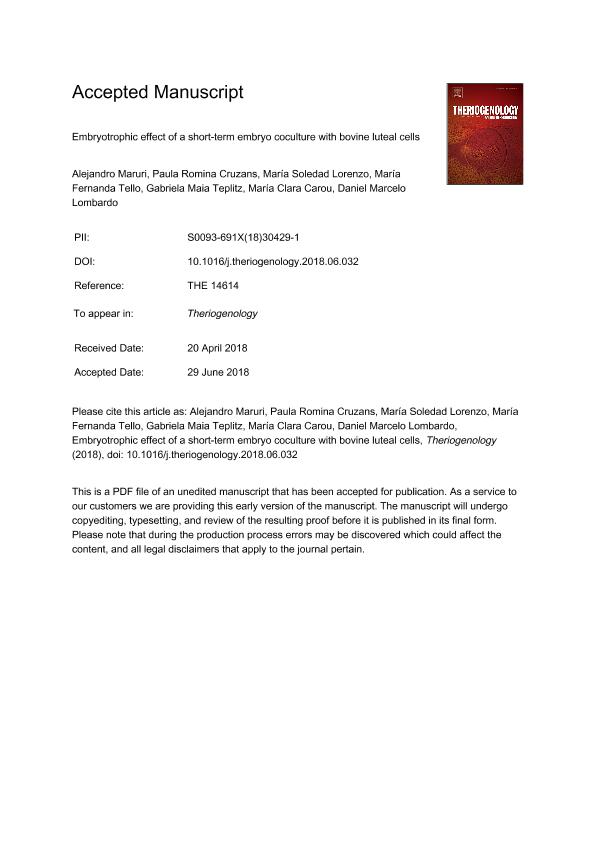Artículo
Embryotrophic effect of a short-term embryo coculture with bovine luteal cells
Maruri, Alejandro ; Cruzans, Paula Romina
; Cruzans, Paula Romina ; Lorenzo, María Soledad
; Lorenzo, María Soledad ; Tello, Maria Fernanda; Teplitz, Gabriela Maia
; Tello, Maria Fernanda; Teplitz, Gabriela Maia ; Carou, María Clara; Lombardo, Daniel Marcelo
; Carou, María Clara; Lombardo, Daniel Marcelo
 ; Cruzans, Paula Romina
; Cruzans, Paula Romina ; Lorenzo, María Soledad
; Lorenzo, María Soledad ; Tello, Maria Fernanda; Teplitz, Gabriela Maia
; Tello, Maria Fernanda; Teplitz, Gabriela Maia ; Carou, María Clara; Lombardo, Daniel Marcelo
; Carou, María Clara; Lombardo, Daniel Marcelo
Fecha de publicación:
10/2018
Editorial:
Elsevier Science Inc
Revista:
Theriogenology
ISSN:
0093-691X
Idioma:
Inglés
Tipo de recurso:
Artículo publicado
Clasificación temática:
Resumen
The coculture with somatic cells is an alternative to improve suboptimal in vitro culture (IVC) conditions and promote embryo development. Several cell types have been used for this purpose, but there is no information about using luteal cells in short-term coculture with embryos. Consequently, this study aimed to assess the effect of a short-term coculture of early bovine embryos-luteal cells on the in vitro development and embryo quality. Presumptive embryos were cultured from day 0 to day 2 in medium alone (control) or cocultured with bovine luteal cells (BLC-1). Then, embryos from both groups were cultured in medium alone from day 2 to day 8. The development rates on day 8 were compared between groups. The level of reactive oxygen species (ROS) and proliferation rates were evaluated in day 2 embryos and late apoptosis and proliferation rates were determined in day 7 blastocysts. Our results showed that the coculture with bovine luteal cells increased the blastocyst rate compared to the control (50.4% vs. 29.8%; P < 0.01), but there were no differences in the cleavage rates on day 2. The rate of stage 6 blastocysts was higher in the coculture (37.3% vs. 23.8% control; P < 0.01), without differences in the expansion and hatching rates compared to the control. The ROS level in day 2 embryos was higher in the coculture than the control (82 vs. 57.1; P < 0.05), and the cell proliferation rate was higher in the coculture (48% vs. 13% control; P < 0.01), without differences in the mean number of cells between groups. In day 7 blastocysts, the apoptosis rate decreased in the coculture with bovine luteal cells from day 0 to day 2 (4.1% vs. 10.9% control; P < 0.01), whereas the cell proliferation rate and the mean number of cells did not differ between groups. This is the first report of a short-term coculture of in vitro produced embryos and bovine luteal cells. Our model could be an alternative to increase the efficiency of the in vitro production of embryos in cattle.
Palabras clave:
BOVINE EMBRYO QUALITY
,
BOVINE LUTEAL CELLS
,
COCULTURE
,
EMBRYOTROPHIC EFFECT
Archivos asociados
Licencia
Identificadores
Colecciones
Articulos(OCA PQUE. CENTENARIO)
Articulos de OFICINA DE COORDINACION ADMINISTRATIVA PQUE. CENTENARIO
Articulos de OFICINA DE COORDINACION ADMINISTRATIVA PQUE. CENTENARIO
Citación
Maruri, Alejandro; Cruzans, Paula Romina; Lorenzo, María Soledad; Tello, Maria Fernanda; Teplitz, Gabriela Maia; et al.; Embryotrophic effect of a short-term embryo coculture with bovine luteal cells; Elsevier Science Inc; Theriogenology; 119; 10-2018; 143-149
Compartir
Altmétricas



